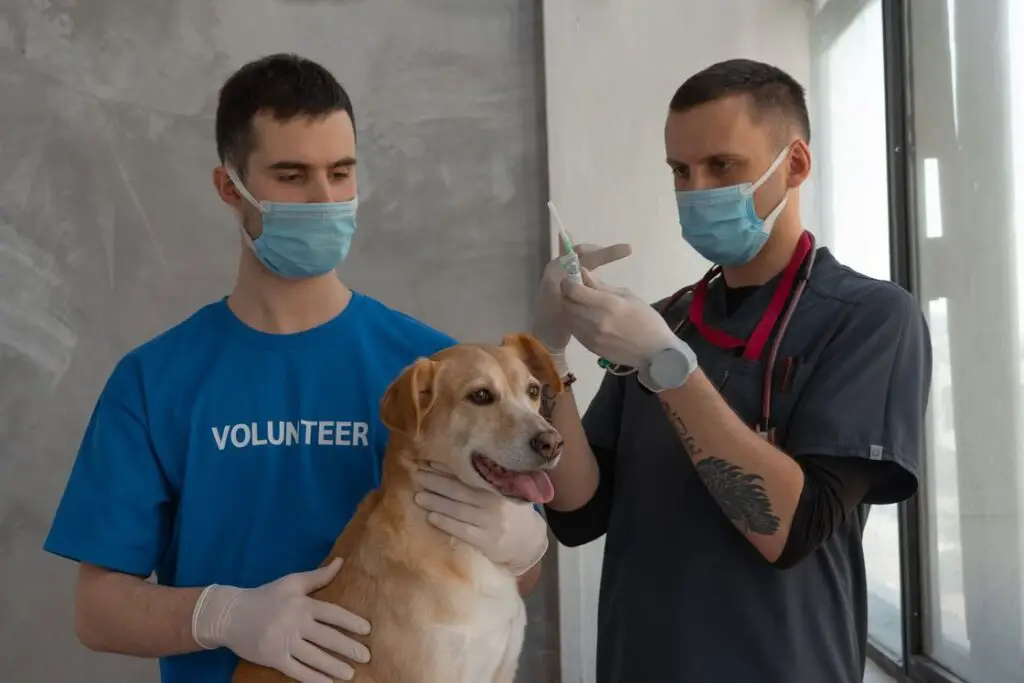What dog vaccines should not be given together? With so many of them available, it can get confusing to determine what can and can not be given together safely. With extensive knowledge of vaccine protocols, we provide dog owners guidance on safe scheduling for combining puppy and adult dog shots.
In this article, we will share insights from my experience on optimal timing between certain vaccines to minimize reaction risks. The goal is to take the guesswork out of the process so you can make informed decisions on vaccinating your dog safely and effectively.
Contents
What Dog Vaccines Should Not Be Given Together?
It is important to note that most dog vaccines are compatible and can be administered together. However, there are a few circumstances when they are inappropriately administered concurrently. These include:
- Canine Distemper and Canine Adenovirus-2: The combination of live attenuated distemper vaccine and adenovirus-2 vaccine in the same syringe can interfere with the effectiveness of both vaccines. The recommendation is to administer these vaccines separately.
- Canine Distemper and Canine Parainfluenza: Combining these two vaccines in the same syringe may reduce the effectiveness of the parainfluenza component. It is best to administer to dogs wth distemper separately to ensure optimal protection.
- Canine Leptospirosis and Rabies: These vaccines increase the risk of adverse effects when given together. It is best to administer them individually, at least two weeks apart.
In addition, it is essential to take into account the following considerations:
- Rabies and any other vaccine: It should administer rabies vaccines separately from other ones to monitor and address potential adverse reactions effectively.
- Multiple vaccines on the same day: While most vaccinations may be administered simultaneously, avoiding vaccinating your dog twice, and limiting the number of them administered on the same day is recommended to minimize the risk of overwhelming the immune system.
What Factors Influence Vaccine Compatibility?
When administering dog vaccines, several factors must be considered to determine which ones are compatible for simultaneous administration. To choose which vaccinations can be given to dogs simultaneously, it is necessary to consider several criteria. These factors are critical in optimizing vaccine effectiveness and minimizing the risk of adverse effects. These factors include:
- Vaccine interactions. Certain vaccines may interact with each other, affecting their efficacy. It is crucial to identify which can be safely given together and which should be spaced apart to ensure optimum protection. Continuously evaluate vaccine combinations to ensure compatibility and provide the best health outcomes for your pet.
- Overwhelming the immune system. Administering multiple vaccines at once can strain a dog’s immune system. While dogs have robust immune responses, overwhelming the system with too many vaccines simultaneously may increase the likelihood of negative effects. At Care Animal Hospital, every member of my team follows recommended guidelines to determine the appropriate number of vaccines to administer during a single visit, considering the dog’s age, health status, and vaccine history.
- Individual dog’s health. Every dog is different, so it is important to consider their medical history when arranging immunizations. Dogs with compromised immune systems or previous adverse reactions may require a more cautious approach to vaccine administration. Our veterinarians assess the dog’s overall health and tailor vaccination protocols to minimize risks and optimize protection.
What Is the Importance of Vaccination and Monitoring?
Beyond understanding which vaccines should not be given together, it is crucial to emphasize the significance of regular vaccination and ongoing monitoring for the overall health and well-being of dogs. Here are three key points to consider:
Vaccine Schedule and Booster Shots
Following a recommended vaccine schedule ensures that dogs receive protection against diseases. Puppies require vaccinations to establish immunity, followed by regular booster shots.
Adhering to the appropriate vaccination schedule, as advised by our veterinarians, helps maintain a robust immune response and safeguards against preventable illnesses.
Monitoring for Adverse Reactions
While vaccines are safe, it is essential to monitor dogs for any adverse effects following vaccination. Common reactions may include mild swelling or tenderness at the injection site, lethargy, or a slight fever.
Yet you should contact me immediately if your response is severe or continues. Regular monitoring lets me promptly address concerns, ensuring your dog’s health and well-being.
Lifestyle and Exposure Considerations
The vaccination needs of a dog may vary based on their lifestyle and potential exposure to certain diseases. For example, dogs that interact with other animals or participate in activities like boarding, grooming, or dog shows may require additional vaccines, such as Bordetella or Canine Influenza.
Discussing your dog’s lifestyle with our Care Animal Hospital veterinarians enables personalized vaccine recommendations that align with their specific needs.
By staying up-to-date with vaccinations and maintaining open communication with our veterinarians, dog owners can ensure their pets receive the necessary protection against diseases while minimizing potential risks.
Related Questions
How Many Vaccines Can a Dog Have at Once?
Dogs can receive multiple vaccines at once, with most veterinarians recommending a maximum of two vaccines during a single visit. However, the exact number of them administered simultaneously may vary based on individual factors such as the dog’s age, health status, and vaccine history, as determined by our veterinarians.
How Far Apart Should Dog Vaccines Be Given?
Vaccines for dogs should be spaced apart by at least two weeks to ensure optimal effectiveness and minimize the risk of adverse reactions. This spacing allows each vaccine to stimulate a robust immune response without interference from others. However, this may vary based on the dog’s individual needs.
What Is the Gap Between Deworming and Vaccination?
The recommended gap between deworming and vaccination in dogs is around two weeks. This waiting period allows the dog’s immune system to recover from the deworming treatment and ensures that the vaccines can be administered at maximum effectiveness. However, it is essential to consult with our veterinarians, at Care Animal Hospital, for specific guidelines.
Conclusion
Understanding which shots for dogs should not be given together is vital for ensuring the effectiveness and safety of vaccinations. Adhering to recommended vaccination schedules, consulting with our veterinarians, and monitoring for adverse reactions are crucial steps in safeguarding the health of your beloved pets.



